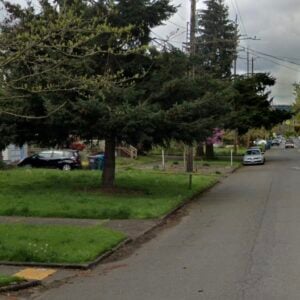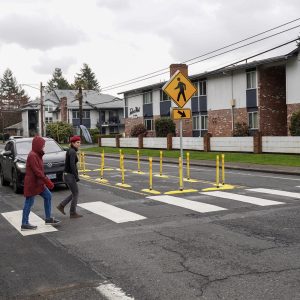
With a budget teetering on the ledge of a cliff unlike any in their history and recent decisions that have whipped Portlanders of all persuasions into a frenzy of distrust, the Portland Bureau of Transportation is about to embark on a delicate conversation about renewal of a local gas tax that’s key to their financial health.
First passed by voters in 2016, the Fixing Our Streets 10-cent tax on gas purchases has become one of PBOT’s most important and reliable sources of revenue. When it was new, it passed with just 52% support. But after four years of delivering projects, it was renewed in 2020 with a whopping 77% approval.
With another renewal coming up in May 2024, PBOT is ramping up for what is likely to be a more challenging political environment than what they enjoyed four years ago. And the stakes could not be higher this time around as PBOT expects the tax to raise $75 million.
PBOT currently faces a $32 million budget shortfall and faces a 30-35% cut in their discretionary budget (what their top budget planner referred to as “our keeping the lights on” budget) in their 2024-2025 budget cycle. After years of cutting the bone, if PBOT doesn’t get a lifeline from City Hall this time around, they will make massive cuts to staff and programs the likes of which we have never seen.
If they don’t renew Fixing Our Streets for a third time, that $32 million annual shortfall balloons to a $52 million shortfall. PBOT Director of Policy, Planning, and Projects Art Pearce said at a joint meeting of the bicycle and pedestrian advisory committees Wednesday night that if the renewal fails it “Would be an additional problem we’re not actually accounting for… so we’re proceeding with a level of optimism that that is renewed again.”
Full details of Fixing Our Streets 3 (FOS3) aren’t finalized yet, but PBOT gave a preview of what to expect at a meeting of the program’s oversight committee Tuesday night where they released results of a poll of likely voters taken earlier this month.
The main takeaway is that PBOT is likely to pass the tax, but only if they put a very similar measure on the ballot as the one voters passed in 2020. In their poll, PBOT also asked people for feedback on extending the tax beyond four years and whether or not they’d support a 15-cent tax or indexing it to inflation.



The poll queried 600 likely voters and according to what PBOT released last night, 71% of them said Portland is “on the wrong track.” “Positivity is still stubbornly low,” states a PBOT slide from the meeting. As for transportation issues specifically, they found most Portlanders are more interested in other issues like homelessness, public safety, drugs, housing, and so on. The poll found that when asked what’s on their mind, only 2% of voters mentioned roads, transportation, or traffic congestion.
The good news for PBOT is that nearly 60% of likely voters say they’d support a 10-cent renewal of the gas tax that lasts four years. Poll numbers thus far are similar to what PBOT found in 2019 prior to garnering 77%, so it’s likely FOS3 will pass. “Nearly 6 in 10 Portland continue to support investing in streets and safety through renewal of the gas tax, despite being otherwise very unhappy with the direction of the city and prioritizing competing issues,” PBOT says.
PBOT also asked if people would support a 10-cent tax that would last eight years (instead of four). 52% of respondents said yes.
Other iterations of the tax PBOT is considering failed to receive majority support:
renewal at 10 cents for four years followed by an increase to 15 cents for the next four years (46%),
an increase to 15 cents for four years (37%),
and making the 10 cent tax permanent but indexed to inflation (37%).
“All of these also have high levels of ‘strong’ opposition,” PBOT found.
As for how to spend the $75 million, PBOT says they’d continue the same “balanced approach to basic maintenance, safety, and street services.” The funds would be split into three $25 million buckets: “smoother streets and paving,” “community transportation street services,” and “safer streets projects.”
Notable changes in FOS3 under consideration include switching $20 million in paving they would typically contract out to internal PBOT crews, who would focus on more preventative pavement maintenance instead of complete road rebuilds (this would also preserve jobs as layoffs loom). PBOT also wants to use half of the $25 million allocated to safety projects to matching dollars for grants and “strategic investments.”
The details of FOS3 could still change. PBOT will present the polling results and their proposals to the bureau’s Budget Advisory Committee at their meeting tomorrow night.







Thanks for reading.
BikePortland has served this community with independent community journalism since 2005. We rely on subscriptions from readers like you to survive. Your financial support is vital in keeping this valuable resource alive and well.
Please subscribe today to strengthen and expand our work.
Maybe one reason PBOT is so car-centric is that they know they depend on the goodwill of voters to pass these levies. And since almost everyone drives cars, PBOT can’t be seen as too bike-friendly, lest they lose all of their funding.
I’m just spitballing here but overall I think it speaks well of Portlanders that we are willing to tax ourselves to pay for the streets we use.
The average person in Oregon who drives 12,000 miles a year pays about $150 in state gas tax a year..
You think we should pat ourselves on the back for that?
$12 a month to pay for road use and maintenance?
I don’t mean to be a pain, and I’m getting push-back in similar comments on another article, but this still doesn’t make sense to me:
So, the FOS gas tax is worth $20million per year? PBOT’s budget is around $500million per year. I get that every million dollars is huge and important, but surely there are bigger and more reliable sources than the 4% that seems to be the FOS gas tax, which has some restrictions on its use too. What am I missing? Is it worth more than $20m? Are other funds even more restricted? Is it that much of PBOT’s revenue is from services to BES? That much of the budget is used paying debt? That we’re relying on slivers of the budget to carry out essential maintenance, hence this 4% is crucial? I really am trying to better understand PBOT’s funding.
Basically PBOT has already borrowed a lot of money based on an assumption that the tax was already renewed. Unfortunately it’s how most governments operate.
you might want to start here.
While I hope the gas tax passes, I also hope that our new elected leaders find a more consistent and predictable way to fund transportation. What happens when most cars are EVs?
Maybe we mandate equal splits in PBOT/ODOT modal spending until modal shift starts happening? “90% of people drive everywhere for everything”; well, maybe because 90% of our transpo funding (if it’s even that low) goes to car/truck infrastructure.
I have to ask about the headline photo. Who builds a brand new bike facility and puts a phone pole in the path?!?
I’m guessing they did that so people could readily identify that paving as a Portland sidewalk or bike path.
Oregon planners.
The pole was already there on the shoulder of capitol highway and they didn’t want to move the pole because that would be a hassle, and its not a big deal since it’s to the side of the path anyways.
PBOT would never, ever leave a pole in a driving lane, regardless of the level of hassle.
The concrete in sidewalks are nature’s way of growing telephone poles.
They should at least put some reflectors or something on it.
Why is. PBOT always spedintg molney they don’t have on big new projects instead of fixing the ramps they’ve already been sued over, & the streets that have been crumbling in the exact same places for over a decade?
PBOT answers to ODOT directors who answer to PBC (Portland Biz Chamber) members and Portland Prosper–ity for the already prosperous Development Commission. That puts PBOT on the bottom of the pyramid. PBOT employs platoons of “star-chitect” wannabees.
Mapps and Williams behavior around the Broadway scandal has likely hurt the chances of passing this somewhat. Hopefully Mapps won’t be around for most of the covered period, but if it fails by a close margin their actions will be one of the reasons.
I’ve heard Mapps may run for Earl Blumenauer’s seat. That would be interesting
There is not enough being done about gross polluters, often time, derelict transient and vagrant related vehicles or illegally modified vehicles that smell like leaf blower or go kart.
An effective deterrent to vagrant and transient related vehicle activity is to tow plateless vehicles expeditiously, and pull them over and tow them if they for license or insurance violations.
Another great BP article. As a consulting civil engineer who, for 40 years, helped Oregon and Washington get mostly car-centric infrastructure built with a sprinkling of active transportation projects, I continue to be amazed at how much I learn from reading BP articles and comments. A lot of BP readers are critical of highway engineers for good reason. My bet is that if those scoundrels read BP and thought about what they read, our transportation system would not be so pitiful. Thank you all!